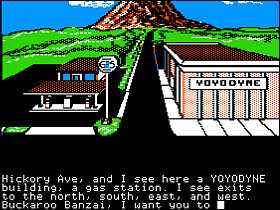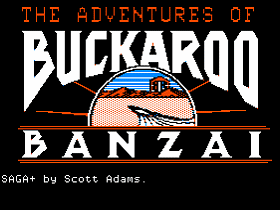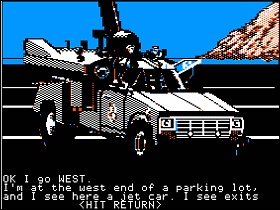 The Game: Players control the actions of rock star brain surgeon (or is that the other way around?) Buckaroo Banzai, who starts the game in Yoyodyne Headquarters and must quickly accumulate the necessary gear to embark on an adventure to fend off the evil Red Lectroid’s latest bid to destroy the Earth. (Adventure International, 1984)
The Game: Players control the actions of rock star brain surgeon (or is that the other way around?) Buckaroo Banzai, who starts the game in Yoyodyne Headquarters and must quickly accumulate the necessary gear to embark on an adventure to fend off the evil Red Lectroid’s latest bid to destroy the Earth. (Adventure International, 1984)
Memories: After virtually starting the home computer adventure gaming craze in the late 1970s, game creator Scott Adams was in a crowded field by 1985. The original Adventure International games – which paired simple graphics with concise, no-nonsense text descriptions – had since been duplicated and surpassed. Sierra On-Line‘s early Hi-Res Adventures were in much the same vein, and Infocom took the text/interactive fiction idea and ran with it sans graphics (at least for a while), but once adventure games were married with real-time action elements (the Ultima series, the Apshai games, King’s Quest, and let’s not forget that whole Zelda thing over on the NES), the days of text-with-illustrations adventures such as those turned out by Scott Adams were numbered.
 When Sierra’s fortunes with this format were flagging, that company aligned itself with Jim Henson to do an expansive, expensive, and – for the makers of the game – frustrating computer game adaptation of The Dark Crystal, a game that made Sierra’s Roberta Williams swear off doing any further licensed adventure games. Similarly, Scott Adams’ Adventure International landed the rights to do a text adventure based on The Adventures Of Buckaroo Banzai, but by the time the game came out, the movie was already in the process of flopping miserably in theaters. Of course, Buckaroo Banzai has since picked up a significant cult following, but it didn’t pick it up in time to help Adams: Adventure International folded in 1985.
When Sierra’s fortunes with this format were flagging, that company aligned itself with Jim Henson to do an expansive, expensive, and – for the makers of the game – frustrating computer game adaptation of The Dark Crystal, a game that made Sierra’s Roberta Williams swear off doing any further licensed adventure games. Similarly, Scott Adams’ Adventure International landed the rights to do a text adventure based on The Adventures Of Buckaroo Banzai, but by the time the game came out, the movie was already in the process of flopping miserably in theaters. Of course, Buckaroo Banzai has since picked up a significant cult following, but it didn’t pick it up in time to help Adams: Adventure International folded in 1985.
And the worst part of it all is that, while there’s a undoubtedly a great Buckaroo Banzai video or computer game just waiting to happen, this isn’t it. As with so many attempts to adapt other media into computer adventure games in the 1980s, Buckaroo seems to be a very slow-motion replay of certain elements of the movie, with other scenes invented specifically for the game… and virtually all of it minus the movie’s fun or suspense factors. The  ancillary characters that make the movie are absent from the game (and in any case, what would they do other than rattle off the lines that devotees of the movie would already know?). Buckaroo Banzai would’ve benefitted greatly from having enough daring to really go off the program and invent virtually an entirely different story in the same “universe” that checked off some of the same plot points (see also: Infocom’s Hitchhiker’s Guide To The Galaxy), and it’s a rare example of a licensed property that probably could’ve survived macro-scale tweaks to its story.
ancillary characters that make the movie are absent from the game (and in any case, what would they do other than rattle off the lines that devotees of the movie would already know?). Buckaroo Banzai would’ve benefitted greatly from having enough daring to really go off the program and invent virtually an entirely different story in the same “universe” that checked off some of the same plot points (see also: Infocom’s Hitchhiker’s Guide To The Galaxy), and it’s a rare example of a licensed property that probably could’ve survived macro-scale tweaks to its story.  Then again, maybe the movie license (and the inevitable studio input that comes with it) was the problem.
Then again, maybe the movie license (and the inevitable studio input that comes with it) was the problem.
Considering that the rights to do the sequel announced in the movie’s end credits have been tangled for so long that the sequel will almost certainly never be made, it’s sad that the game didn’t add a completely new story to the movie’s universe – it would almost certainly be better remembered.